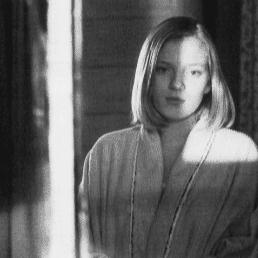
Starring Ian Holm, Sarah Polley, Bruce Greenwood, Arsinee Khanjian, Tom McCamus, Maury Chaykin Alberta Watson and Gabrielle Rose. Written and Directed by Atom Egoyan.
Based on a novel by Russell Banks set in upstate New York, the story is moved to a small town in interior British Columbia. The film opens with a beautiful, unexplained shot of a couple sleeping on a floor with their young daughter between them, a shot whose meaning is revealed later in the film. A big city shark of a lawyer Mitchell (Holm) arrives into town to try and stir up a lawsuit. Previously, a school bus carrying almost all of the town's children hit a patch of ice, slid into the river, and killed everyone except for the driver (Rose) and a teenage girl Nichole (Polley). Mitchell preys on the grieving parents' anger at their losses, and signs up several families for a negligence suit against the town and the bus company. Mitchell has lost his own daughter in a different way. She is a drug addict who has been in and out of drug rehab centers, and regularly calls up dad for more money, either for drugs or drug treatment. In one poignant scene, he tells his daughter he doesn't know how to talk to her - it depends on her chemical state. His daughter's collect phone calls arrive throughout the movie, and the tragic loss in the town continually reminds him of his daughter - the good times when she was a child, and the bad times since.
The film revolves primarily revolves around the character of Nichole. A budding pop singer, she became wheel-chair bound after the accident, and is reluctantly dragged into the lawsuit by her father to bolster Mitchell's lawsuit. Mitchell takes to Nichole in a fatherly way, reminding him of the daughter he's lost. Nichole's father (McCamus) is first shown as a loving supporter of her daughter's singing career (songs sung by Polley herself, including One More Colour by Jane Sibbery and Courage by The Tragically Hip, and she is excellent - I'll be buying the soundtrack), but soon we see Daddy taking Nichole into the barn for a moment in the hay, and what will happen next is unmistakeable. Nichole also babysits for a neighbour (Greenwood) whose wife had recently died. He was in his truck following the bus, and gets to watch the bus go over the edge and into the river with his kids in it. She acts as an almost surrogate mother to his kids, as a matter of fact she is loving and helpful to all the children. The resolution of the movie, which is somewhat surprising, but fitting, hinges on how Nichole reacts to these three men.
Winner of The Grand Prix and two other critics awards at Cannes, plus best film and best Canadian film awards at The Toronto Film Festival, The Sweet Hereafter lives up to its accolades. Everything about it is great. The cinematography is luminous and haunting - the snowy B.C. forests and valleys are spectacular. The film score by Mychael Danna has an Asian feel to it and enhances the otherworldly feel to the film. Like all of Egoyan's films, the surface of the film is cool and distant, but the underlying emotions and feelings are intense and dark. The script is restrained - this could have been a schlocky movie of the week - but each character is treated with dignity and respect. The scene where the bus goes over the edge and into the river is uniquely presented. There are no fastcuts or action closeups. You see it as Greenwood's character sees it - a bus slowly being swallowed into the water with the faint sound of screaming children in the background, totally helpless to do anything to save them. This restraint makes the emotional effect more real and powerful in this scene, and throughout. You identify with the characters and the pain each one feels. The story is told with constant time changes, flashbacks and flashforwards, but it is suprisingly easy to follow and understand where in time the film is operating.
The actors are uniformly excellent. Holm is sympathetic even as he plays a manipulative lawyer with his own pain. Even though he is obviously manipulating the townspeople in their grief, we know he understands the pain in losing a child. Greenwood is the best I've ever seen him as a man who has lost his wife and his kids - you can feel his anger and sense of loss. But the highlight of the film is Polley. She illuminates the screen whenever she appears. Egoyan has been quoted as saying he started using more and more closeups of Polley's face as filming progressed, because her face and eyes were able to express so much of her character's goodness and pain. The film is one that stays with you after seeing it. It is about how hard it is for people to connect with one another, and how they try to cope with tragedy. This is a great film. Go see it.




